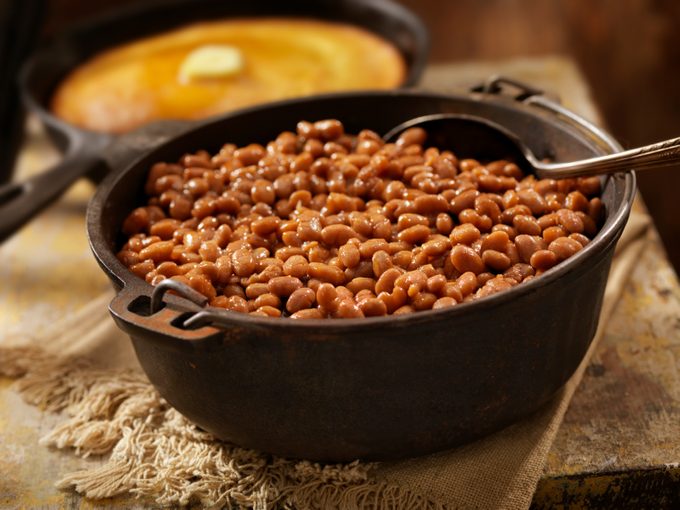Do’s and Don’ts to Beat Bloating
How to tame belly bloat, one and for all

Source: Best Health magazine, May 2015
You know the feeling: Your tummy grumbles and then seems to grow by several sizes as gas fills up your gut. It’s uncomfortable and embarrassing, and that sensation of abdominal discomfort and distension can last for hours until the air finds a way out (or forces you to unbutton your pants).
If misery loves company, you’re in luck: Up to 30 percent of Canadians experience persistent bloating, says Dr. Maitreyi Raman, a gastroenterologist and clinical associate professor at the University of Calgary.
For women, feeling bloated and gassy in the days leading up to their menstrual periods is common and driven by fluctuating hormone levels. At other times of the month, passing gas up to 15 times a day is considered normal, says Dr. Raman, who is also co-author of The Complete IBS Health and Diet Guide.
Don’t panic if you’re feeling abdominal discomfort more frequently. For many sufferers, bloating is simply a consequence of consumption, like eating broccoli or beans.
‘Food is one of the most common reasons we experience bloating,’ confirms Stephanie Clairmont, a registered dietitian in Waterdown, ON, and owner of Clairmont Digestive Clinic, which offers services via phone, Skype and online classes through her website,
stephanieclairmont.com.
In addition to the usual suspects of sulphurous veggies (like broccoli, cauliflower and brussels sprouts) or legumes (think kidney beans, lentils and chickpeas), which are galacto-oligosaccharides, research is now focusing on a group of foods called FODMAPs. This acronym stands for fermentable oligosaccharides, disaccharides, monosaccharides and polyols, and includes everyday foods such as apples, pears, milk, onions, garlic and wheat.
‘They are short-chained sugars that are easily fermented in the gut,’ says Clairmont, adding that fermentation can lead to gas and bloating. In all people, some FODMAP foods are poorly broken down and not completely absorbed in the small intestine, but certain people are more sensitive and experience more symptoms. They move into the large intestine, where bacteria treat the molecules as food and break them down, producing gas. ‘I think we’re going to be hearing more and more about them. Following a low-FODMAP diet significantly helps a majority of my clients ‘ over 80 percent.’
Additionally, there are other dietary and lifestyle factors that may contribute to belly bloat. Follow our 10 golden rules to say goodbye to excess gas for good.
Do
Ensure regularity. Eat a breakfast of soluble fibre (good options include oatmeal, flax and chia seeds), and drink at least six glasses of water each day.
Exercise. Thirty minutes of moderate activity each day will help food move through the digestive tract, which can help with constipation ‘ a possible cause of bloating.
Eat slowly. Sit down to enjoy meals and chew food slowly to avoid swallowing air. Thoroughly chewed food is also easier to digest. Eat until you feel 70 percent full.
Manage stress. ‘The mind-gut connection is very real, and stress and worry can affect our digestive systems,’ says Clairmont.
Expect some bloating. ‘If you’re predisposed to bloating, it’s unrealistic to think that it will completely go away, even if you follow all of these suggestions,’ says Dr. Raman.
Don’t
Chew gum or drink carbonated beverages. If you suffer from bloating regularly, these will cause you to swallow air that moves through the entire digestive tract.
Overindulge in caffeine or alcohol. Both can compromise (relax) the muscle between the esophagus and the stomach, which can let in air. Alcohol can cause spasms in the small intestine that can lead to bloating.
Eat dairy products containing lactose. Lactose is the naturally occurring sugar found in milk, yogurt and ice cream. As many as one in three Canadians is lactose intolerant, meaning they lack sufficient enzymes to digest this sugar. It ends up in the large intestine, where it causes gas and bloating. If symptoms clear up in 24 to 48 hours after eliminating lactose, that’s likely the cause (a simple blood test can confirm this).
Consume too many raw vegetables. Avoid notorious gas producers such as broccoli and cabbage. Dr. Raman recommends peeling off the skins (whenever possible) and steaming vegetables to make the fibre more tolerable.
Snack all day. ‘You need to give your body a break to digest food,’ says Clairmont. She recommends waiting at least two hours between snacks and meals.
When to see a doctor
Gastroenterologist Dr. Maitreyi Raman, a clinical associate professor at the University of Calgary, says to see a doctor if your bloating is accompanied by pain, constipation or ‘alarm’ symptoms such as bleeding from the bowel, unexpected weight loss, fever, chills or night sweats. Additionally, a doctor can help diagnose chronic benign conditions like lactose intolerance and irritable bowel syndrome (IBS), as well as more serious diseases like celiac and inflammatory bowel disease (such as Crohn’s disease or ulcerative colitis).




